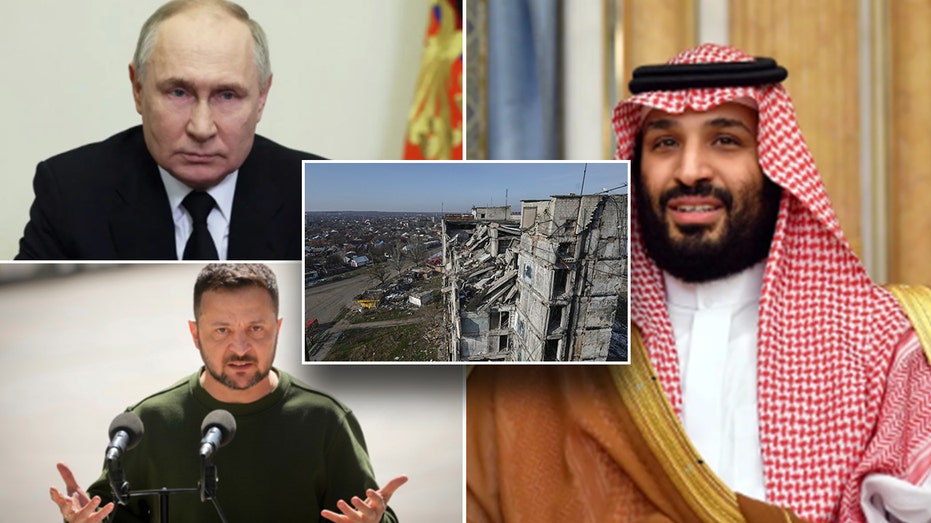Saudi Arabia has emerged as a central player in the pursuit of a U.S.-brokered peace deal between Russia and Ukraine, in large part due to the political capital it wields with its massive oil reserves.
President Donald Trump suggested Riyadh as a meeting place to kick off face-to-face talks between himself and Russian President Vladimir Putin. Putin agreed the location was acceptable. To some it might seem a curious choice, but the Middle Eastern kingdom has reasons to involve itself in finding an end to the conflict happening thousands of miles from its borders.
For Crown Prince Mohammed bin Salman, mediating peace negotiations would help to solidify his standing as a global leader. It also offers him a leg up on Qatar, which was heavily involved in negotiations between Israel and Hamas. Qatar has also, since 2023, helped facilitate the return of dozens of Ukrainian children taken to Russia during the war.
Trump cited both his and Putin’s relationship with the Saudis in his remarks. ‘We know the crown prince, and I think it’d be a very good place to be,’ he said.
It’s why Trump’s Middle East envoy Steve Witkoff has taken a front-row seat to the U.S. dealings in Eastern Europe. Witkoff jetted off to Moscow this week and returned home with Marc Fogel, an American teacher who had been detained by the Kremlin on charges of bringing medical marijuana into Russia in 2021. Witkoff credited Prince Mohammed for his ‘instrumental’ role in mediating the release.
Trump said in a Truth Social post Wednesday he’d designated Secretary of State Marco Rubio, Director of the CIA John Ratcliffe, National Security Advisor Michael Waltz and Witkoff to lead peace negotiations but failed to mention the special envoy he originally hired for the task, retired Gen. Keith Kellogg. The post came after he spoke by phone with both Putin and Ukrainian President Voldymyr Zelenskyy.
The Saudi kingdom is the largest exporter of oil in the world and plays a critical role in setting global prices. Higher oil prices generate more revenue for the Kremlin from Russia’s own exports.
In 2024, Russia made $108.22 billion from oil and gas sales, 26% more than the previous year, according to Reuters.
Trump has repeatedly pressed nations in the OPEC alliance to flood the market with oil and lower the global price, believing Russia would be more open to negotiations if its war coffers are hit.
‘Right now the price is high enough that that war will continue,’ Trump told executives at the World Economic Forum at Davos last month.
‘You got to bring down the oil price,’ he said. ‘That will end that war. You could end that war.’
The Trump team is far closer to the Saudis than the Biden administration was, though relations may strain over Trump’s plan to move Palestinians out of the Gaza Strip and into neighboring nations and take over the territory. Still, bin Salman has pledged to invest as much as $600 billion in the U.S. over the next four years.
Trump, who spoke to bin Salman just ahead of his Davos remarks, said he would be asking ‘the Crown Prince, who’s a fantastic guy, to round it out to around $1 trillion.’
The Saudis and Ukraine have a common enemy in Iran, which has long been providing Russia with Shahed drones and other munitions.
‘The [Iran-backed] Houthis have deployed Iranian weaponry against Saudi Arabia, targeting critical infrastructure, including oil pipelines and airports,’ said Daniel Balson of the advocacy group Razom for Ukraine. ‘In fact, repeated Houthi attacks against highly urbanized targets like Khamis Mushait in Saudi Arabia have served as a prelude for Russia’s use of drone warfare against Ukrainian cities.’
In May 2023, bin Salman invited Zelenskyy to speak at a meeting of Arab leaders in Jeddah. Later that year, Zelenskyy and bin Salman held closed-door talks with diplomats from 40 countries on ending the war, but Russia did not participate.
Putin thanked Saudi Arabia in August for its role in negotiating the most extensive prisoner swap since the Cold War, securing the release of 26 people.
